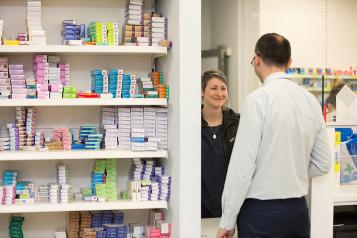Ask Your Pharmacist Week

Pharmacies are part of the NHS family and the range of clinical services they provide has expanded significantly in recent years.
Pharmacists train for five years before they qualify – learning about the human body, the use of medicines to treat disease and diagnosing common illnesses. After that they undergo continuing professional development, so that their skills are always up to date.
Very importantly, they know how to spot the signs of serious illness and will refer you to a doctor or other suitable health care professional for a check-up or for treatment if necessary.
Aside from the pharmacist, every member of the pharmacy team has undergone regulated training in order to provide an effective service and keep you safe.
Pharmacists are supported by a team of trained staff working under their direct supervision. They can include:
- Pharmacy technicians – skilled members of the pharmacy team who prepare, dispense and supply and issue a range of medicines to patients
- Accredited checking technicians, who are specially trained to undertake accuracy checks of medicines
- Dispensing assistants, who support the pharmacist in the management of dispensary stock
- And Medicines counter assistants, who provide a range of essential functions to support the rest of the team.
Pharmacies are part of the NHS family and the range of clinical services provided by community pharmacies has expanded significantly in recent years.
You have always been able to get prescription medicines, urgent care for common illnesses, lifestyle support and medicines advice to help you manage your long-term medicinal conditions. The NHS has built on this, with new services such as blood pressure checks for the over 40s, oral contraception and expanded support for people with Parkinson’s disease and osteoporosis, among other conditions.


